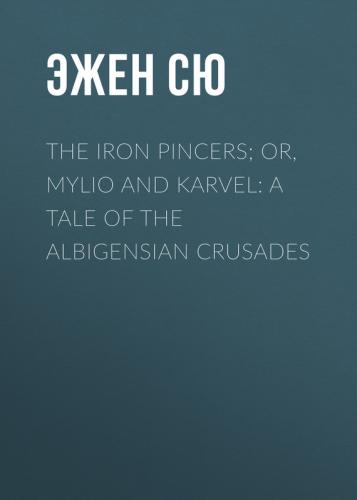Garlands of flowers and streamers of ribbons hanging from gilt pillars mark the sacred precincts of the tribunal. Farther away stands a brilliant and choice assembly – noble ladies and knights, abbots and abbesses from the neighboring monasteries. Mischievous looking pages and jesting equerries have also put in an appearance at this session of the Court of Love. Among the vast assemblage are the eleven friends of Marphise, who the previous afternoon enjoyed the liberality of her hospitality and joined her in swearing vengeance upon Mylio the Trouvere, a vengeance, however, that he escaped by failing at the rendezvous which engaged him to be in Marphise's orchard at night. The petulant and vindictive little Countess Ursine, the bitterest of all the twelve enraged beauties, can not keep in one place for a single instant. She bristles from one lady friend to the other with an air of importance and anger; whispers in the ear of one; makes a sign to another, and from time to time exchanges significant looks with Marphise, the President of the tribunal. Two large posts covered with foliage and flowers and each surmounted with a silk flag – one bearing the effigy of Venus, the other that of her son Cupid – mark the entrance to the Court of Love. At the entrance of the enclosure stands Giraud of Lancon, a noble knight, who officiates as the porter of the Chamber of Sweet Vows. He allows no lady pleader to enter without exacting from her the toll of a kiss. Within the enclosure, and ready for the orders of the tribunal, are William, Seigneur of Lamotte, whose office is Conservator of the High Privileges of Love; Lambert, Seigneur of Limoux, who is the Bailiff of the Joy of Joys; Hugues, Seigneur of Lascy, who is the Seneschal of Sweet-Marjoram, and, as such, the one upon whom the duty devolves of introducing the fair pleaders, from whom he also has the right to exact the fee of a kiss; moreover it is his duty to assist the Bailiff of the Joy of Joys in chaining with streamers of ribbons and flowers those upon whom the tribunal pronounces sentence, and to lead them to the Prison of Love – a somber tunnel of verdure furnished with moss couches, and located at a secluded spot of the garden.
Such are the morals of these noble women and men; such are the pastimes and amusements of the nobility of this epoch. Son of Joel, listen and look; but do not feel surprised if at times your heart should leap with indignation or sink with disgust.
Presently silence is ordered. Marphise, the President, opens a little cage with gilt bars that is placed near her. Two white doves fly out, flutter about for a moment, and then perch themselves on one of the branches of the elm where they fall to cooing lovingly. The flight of the doves announces the opening of the session.
Конец ознакомительного фрагмента.
Текст предоставлен ООО «ЛитРес».
Прочитайте эту книгу целиком, купив полную легальную версию на ЛитРес.
Безопасно оплатить книгу можно банковской картой Visa, MasterCard, Maestro, со счета мобильного телефона, с платежного терминала, в салоне МТС или Связной, через PayPal, WebMoney, Яндекс.Деньги, QIWI Кошелек, бонусными картами или другим удобным Вам способом.
